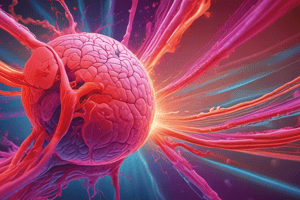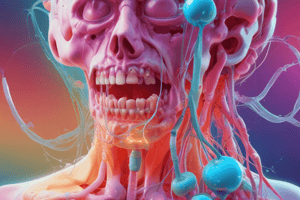Podcast
Questions and Answers
What is the term used to describe the physiological and psychological responses to stress identified by Cannon in 1914?
What is the term used to describe the physiological and psychological responses to stress identified by Cannon in 1914?
- General Adaptation Syndrome
- Psychoneuroimmunology
- Allostasis
- Stress Response (correct)
What are the three stages of the General Adaptation Syndrome (GAS)?
What are the three stages of the General Adaptation Syndrome (GAS)?
- Alarm, Resistance, Exhaustion (correct)
- Shock, Stability, Overload
- Stress, Adaptation, Homeostasis
- Alarm, Recovery, Resistance
What is allostatic overload?
What is allostatic overload?
- A state of equilibrium in the body
- A successful adaptation to prolonged stress
- A physiological response without psychological impact
- Overactivation of adaptive responses leading to disease susceptibility (correct)
Which of the following best defines homeostasis?
Which of the following best defines homeostasis?
What does psychoneuroimmunology (PNI) study?
What does psychoneuroimmunology (PNI) study?
What physiological changes were demonstrated by Selye as a result of stress?
What physiological changes were demonstrated by Selye as a result of stress?
Which of the following best describes anticipatory psychological stressors?
Which of the following best describes anticipatory psychological stressors?
What result can occur if the resistance stage in GAS fails to restore homeostasis?
What result can occur if the resistance stage in GAS fails to restore homeostasis?
Which term describes stability through change in the context of stress responses?
Which term describes stability through change in the context of stress responses?
What physiological changes are NOT typically associated with the stress response?
What physiological changes are NOT typically associated with the stress response?
What role do glucocorticoids play in response to stress?
What role do glucocorticoids play in response to stress?
How does cortisol affect blood glucose levels during stress?
How does cortisol affect blood glucose levels during stress?
What system complements the effects of catecholamines during stress?
What system complements the effects of catecholamines during stress?
What is the primary function of the HPA axis during stress?
What is the primary function of the HPA axis during stress?
What may prolonged exposure to elevated cortisol levels lead to?
What may prolonged exposure to elevated cortisol levels lead to?
What psychological factor can influence the physiological response to stress?
What psychological factor can influence the physiological response to stress?
What is often the consequence of chronic stress on the immune system?
What is often the consequence of chronic stress on the immune system?
Which hormone primarily increases cardiac output during stress?
Which hormone primarily increases cardiac output during stress?
What effect do catecholamines have on blood vessels during a stress response?
What effect do catecholamines have on blood vessels during a stress response?
What personality characteristic is associated with the response to stress?
What personality characteristic is associated with the response to stress?
Flashcards are hidden until you start studying
Study Notes
Overview of Stress and Disease
- Stress is a perceived or anticipated threat, leading to interactions between the brain and body.
- Historical context provided by Cannon (1914) and Selye (1946); Selye's General Adaptation Syndrome (GAS) identifies the physiological effects of stress.
- GAS consists of three stages: alarm, resistance (adaptation), and exhaustion (now termed allostatic overload).
- Psychological stress can be anticipatory or reactive, both capable of eliciting physiological responses.
General Concepts
- Evolution of stress research has introduced concepts such as psychoneuroimmunology (PNI) and differentiates allostasis (adaptive responses) from homeostasis (static set points).
- Allostatic overload may increase disease susceptibility if adaptation does not restore homeostasis.
- Psychological stress can contribute to various disorders, including anxiety, depression, obesity, and cardiovascular diseases.
The Stress Response Mechanism
- The stress response operates through the nervous system (autonomic), endocrine system (HPA axis), and immune system.
- Activation of the sympathetic branch triggers catecholamine release (norepinephrine, epinephrine) from the adrenal medulla.
- The HPA axis sequentially releases corticotropin-releasing hormone, adrenocorticotropic hormone (ACTH), and glucocorticoids, primarily cortisol.
Role of Cortisol and Catecholamines
- Cortisol impacts metabolism, enhancing glucose, amino acids, and lipids mobilization while inhibiting glucose uptake by cells.
- Chronic dysregulation of the HPA axis with elevated cortisol levels is linked to disorders like obesity, hypertension, and diabetes.
- Glucocorticoids can influence fetal development and the risk of future disease, with implications for obesity and metabolic syndrome.
- Elevated catecholamines may decrease innate immunity and provoke autoimmune responses while intensifying inflammation.
Physiological Effects of Hormones
- Norepinephrine complements epinephrine, affecting blood flow and mental alertness.
- Epinephrine prioritizes blood supply to the heart, brain, and muscles while improving oxygen delivery.
- The parasympathetic system aims to counteract the sympathetic system, but is less effective during prolonged stress.
Personality and Coping with Stress
- Individual stress responses are moderated by stressor nature, intensity, duration, and personal coping efficacy.
- Personality traits can predict psychological and physical health outcomes based on stress appraisal.
- Adaptive coping strategies (problem-focused) enhance resilience and mitigate negative health impacts, while maladaptive strategies (repression, avoidance) may exacerbate issues.
Aging and Stress
- Aging presents a complex set of neurohormonal and immune changes known as stress age syndrome, which can be both adaptive and damaging.
- Mature coping techniques can alleviate negative behaviors (e.g., smoking, excessive alcohol use) and influence existing chronic health conditions.
Studying That Suits You
Use AI to generate personalized quizzes and flashcards to suit your learning preferences.




